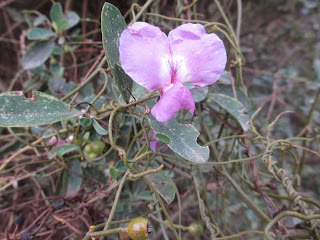The books tell us there are four Wachendorfias found in our area, named after a Botanist from Utrecht. To find three of them on successive days this last week is somewhat surprising! They are noticeable by their pleated leaves and yellow flowers, but they differ in detail.
On our walks in the patch of ex-forest we are monitoring for the return of the fynbos after 100 years of monoculture, we find many of what we think is Wachendorfia paniculata. The leaves are dagger shaped and curved, hairy and quite stiff.
The flowers have compact stamens and the yellow patch in the middle has a dark border.
On a farm I visited in the week I found a different one, the leaves shaped like wide spear-heads, although still pleated, smooth and floppy.
On the flowers, the darker patch is less distinct, and the stamens spread widely.
This might be Wachendorfia multiflora or possibly W. brachyandra. Imagine my surprise driving along a stream on a farm the next day and noticing pleated leaves, but much longer!
Yes, those buds will produce yellow flowers, they told me, so that makes them Wachendorfia thyrsiflora! Three in three days, a hat-trick!
Today near the ruined railway cottages, I spotted these violet flowers from a bulb. We looked for them later, they must have closed for the night! Not yet sure what they are.
We're still waiting for the flowers to open on the Sundews Drosera. I did find one white bud later, but the flower wasn't open yet.
There was a single flower on the 'new' tall erica we found a week or two ago, still not sure what it is.
The Lobelia tomentosa are particularly deep in colour at the moment. They have not stopped flowering since we first found them years back. Sometimes they're less impressive, but now they're vividly violet!
We checked on one of the 'new' plants we've found recently. Only one flower is open on a stem.
This picture shows an assortment, two flower stalks of this unknown plant, a Wachendorfia on the left and perhaps some Combflower Micranthus buds (?).
Close by we found a poor example of the pink pea-type flower we found two examples of recently, some distance away.
All the time we were noticing the strange cloud formations! The lines seemed to radiate from the Kogelberg.
Now is the time for the pink buds of the Everlastings Helichrysums. We previously thought they were different, but once open, they become white.
The daisies we think are Euryops are at their best at the moment. Up till now, only one flower has been open per plant.
Here and there are examples of this delicate, deep pink Erica. There are small clusters of flowers like this, a short way back from the tips. Not sure of the name.
Pippa had to lift a cut pine tree off our single Muraltia heisteria specimen. We've never found another on our searches!
We get the impression the plant is getting bigger.
In that area there are many Aristea africana. We found only one with a flower. They close around midday.
We found another China Flower Adenandra bush!
These Everlastings are white from the beginning!
On a farm in the Greyton area this morning, two other pea-types:
There was also a plantation of yellowwoods! Yesterday in the full sunlight, there were carpets of these deep pink mesembs, growing close to the ground:
It was pleasing to see a skein of more than twenty Blue Cranes fly over!
:-) A


























No comments:
Post a Comment